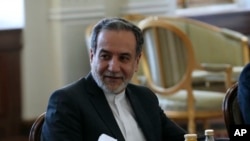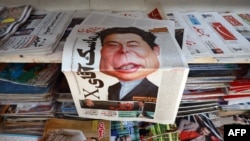
Iran's foreign minister said Saturday in an interview that an opportunity exists for nuclear negotiations with the West, but that it is "limited."
Abbas Araghchi's comments come after the head of the U.N. nuclear watchdog, Rafael Grossi, visited the Islamic Republic for talks with high-ranking officials.
"There is still an opportunity for diplomacy, although this opportunity is not much, it is a limited opportunity," Araghchi said of Iran's nuclear program in the interview with state television.
The visit by the International Atomic Energy Agency (IAEA) director general is seen as one of the last chances for diplomacy before U.S. President-elect Donald Trump returns to the White House in January.
During his first term between 2017 and 2021, Trump imposed a policy known as "maximum pressure" against Iran.
This included Washington tearing up a deal on Iran's nuclear program that had been reached under his predecessor, Barack Obama in 2015.
Trump reintroduced heavy sanctions, which the current U.S. administration of Joe Biden has maintained.
The 2015 deal provided for an easing of international sanctions, in exchange for guarantees that Iran does not seek to acquire nuclear weapons — a charge Tehran has constantly denied it is pursuing.
"Our nuclear path in the next year will be a sensitive and complicated one, but we are prepared for any scenario and conditions," Araghchi said Saturday.
He said Iran will be ready for both "confrontation" and "cooperation," whichever path the other side decides to follow.
During his visit the IAEA chief held talks with Araghchi as well as with President Masoud Pezeshkian and Iran's nuclear chief Mohammad Eslami.
Grossi also toured the key uranium enrichment plants of Natanz and Fordo in central Iran.
His visit comes ahead of a meeting of the IAEA's board of governors later this month at which Britain, France and Germany could propose a new resolution critical of Iran.
In his interview Saturday, Araghchi warned against such a measure.
"If a resolution is passed against us, it will face reciprocal actions by Iran. We will take new measures in our nuclear program that they will certainly not like."
Expectations have run high that Trump will take a harder line with Tehran when he takes office in January.
However, The New York Times reported Thursday that Trump's tech billionaire ally Elon Musk had met the Iranian ambassador to the U.N. in a bid to defuse tensions.
Araghchi in his interview Saturday denied that such a meeting had taken place.
"There has been no meeting between the representative of Iran and Elon Musk," he said.
"Now is not the time for such meetings. It is not wise, and there is not a will for it."








